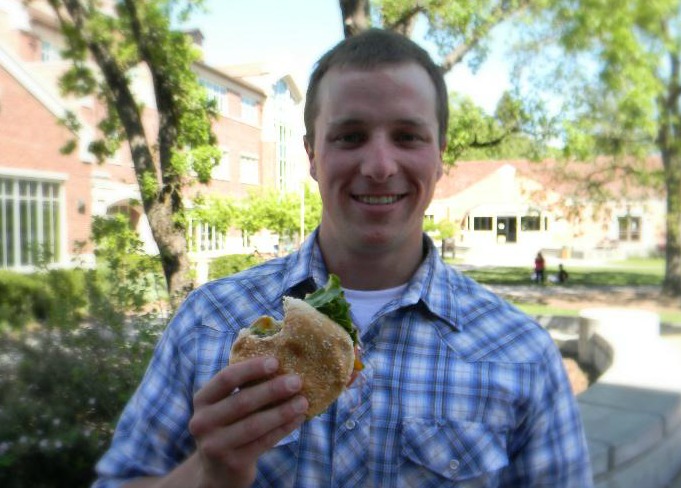Every day around noon, students pack into the Fresh and Natural cafeteria to buy their lunches. They have a variety of foods to choose from, such as burritos, salads, Chinese food and burgers.
However, as of April 1, Shone Farms began a pilot program called the “Farm-to-School Initiative” to sell their grass-fed beef to Fresh and Natural as a healthier, more natural option for their hamburger patties.
Shone Farms is the agricultural extension of SRJC. It has 365 acres of different agricultural enterprises, which gives students the opportunity to gain real-life, hands-on experience in various agricultural fields, from viticulture to equine studies to environmental conservation.
Shone Farm has sold its vegetables to SRJC students and staff for years, but this is the first effort they have made to come into campus with a meat product.
Leonard Diggs, the Shone Farm manager, is going on 15 years with the farm. The goal of this program, he says, is to try to get more on campus to students.
“We’ve been selling a farm box for some years now,” Diggs says, which includes anything grown on the farm that season, including fruits, vegetables, eggs and grass-fed beef products. “But the majority of people who buy that are the faculty and the classified staff. What would it take to feed students, to let them have fresh, healthy food?”
According to Lynn Ellerbrock, the sales and distribution assistant at Shone Farm, “grass-fed beef is lower in fat and calories than grain-fed beef. It also contains a high percentage of good fats, and Omega 3s. Also, raising cattle on grasslands prevents the need for overall antibiotic usage.”
Beef bought in the store is typically grain-fed. Grain-fed cows are usually ready to be finished (used for meat) within a year. However, a diet of mostly grain can result in “marbling,” where the fat mixes into the meat.
Sometimes, not often, the grain can also ferment in the cows’ guts and might cause pathogens to form in the stomach because cows do not typically eat much grain. Grass practically eliminates that potential and reduces the layer of fat on the beef.
However, a grass-fed cow can take 15 to 18 months before it can be used for meat, and until a few years ago Shone Farms did not have the ability to keep the cows for that long.
But, Diggs explains, about seven years ago, Shone Farms began bringing tertiary recycled water from Windsor to irrigate the fields so that the pastures stay green year-round, giving students the ability to raise the cattle on grass alone.
“Students are involved in every facet of production,” said Casey Cole, the Agriculture Ambassador advisor, and the animal instructor at SRJC. Her animal science students help breed, birth, vaccinate and raise the cows.
The purpose of this program is “to provide people with healthy choices while operating in a sustainable way,” Ellerbrock said, and to make these healthy choices easily available to the students by the students.
The downside, however, is that the product is more expensive.
“Everything that we do in agriculture is largely consumer-driven, and right now the majority of consumers aren’t grass-fed beef consumers,” Cole said. “So we wanted to see if we got a positive response and if people were willing to pay the premium price that we have to charge because the animals do have to be around a lot longer in order to be finished on grass.”
The Business Services, Student Affairs, Associated Students’ Senate and the Agricultural/Natural Resources Department support the Farm-to-School Initiative. With the help of surveys and analysis of profit, Shone Farms will discover whether the average student also supports the program.
SRJC student Martha Rivera-Mijes, 18, said, “It’s better for everyone and thus it’s OK that it’s more expensive.” Rivera-Mijes hopes that the program continues.
The pilot program ends with the semester. But Shone Farms will meet with Fresh and Natural representatives this month to discuss the reaction to the grass-fed patties and to determine whether this program will continue in future semesters.
SRJC student Ryan Hodge, 19, became a pescatarian (the only meat he eats is fish) a few years ago because he lost the taste for beef after learning about the unfair and unhealthy treatment of livestock and the conditions in which they are raised and fed. He eats fish now as a healthier alternative to the unnaturally mass-produced meat now on the market.
“Hearing that Shone Farm is trying to change the way that livestock is cared for really instills some hope in me for a future where I can feel comfortable eating meat again,” Hodge said.


